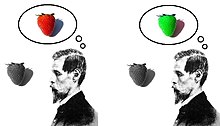12:13 PM
@HWalters: I like how you try to emphasise that phenomenological truths (linked to naive worldviews) may very well have truth conditions that are different from scientific truths (linked to scientific worldviews) and that the difference between ontic and ontological aspects of thing matters. I translate into philosophical language here.
2 hours later…
Please reread. I explicitly say naive vs. scientific worldviews. Apart from that, these terms have specific meanings in philosophical debate. Naive worldviews are closer to common sense (and senses), i.e. claiming the reality of entities like "tables", "trees", etc., whereas scientific worldviews reduce reality to scientific entities like electrons, protons, and neurons (or smaller units) and deny the reality of tables as entities. Inhowfar these two are compatible is subject to current debate.

Inverted spectrum is the hypothetical concept of two people sharing their color vocabulary and discriminations, although the colors one sees — one's qualia — are systematically different from the colors the other person sees.
The concept dates back to John Locke. It invites us to imagine that we wake up one morning, and find that for some unknown reason all the colors in the world have been inverted. Furthermore, we discover that no physical changes have occurred in our brains or bodies that would explain this phenomenon. Supporters of the hypothesis of qualia as non-physical entities argue that...
I once in a philosophy class ponder about an extreme version of an inverted spectrum: Consider the following:
And while I was drawing, you can consider a scenario where you can see how fast my strokes are and how my pen move around
The really strange idea behind this thought experiment is that, could nature make qualia so experimentally untestable it will result in the following things to happen:
For example, perhaps to your perception, what I saw as a long winded wavy ropy thing may be a circle as shown (which to you the following pics may not necessary be what you recognised as a cicle)
In addition to this, even if I drew the above wavy thing very slowly, you might actually perceiving me drawing a circle in under 3s seconds
and more extremely, it might be even possible that all the paragraghs I wrote about may not be what I actually typed out as seen in my perspective
The result is that, there is a possibility that in order for qualia to evade as many attempts of scientific experiments to distniguish between them, every single perception, becomes relative in an extreme sense
2:10 PM
@Secret: If it were that way, there either would have to be a correspondence just like, say, linear transformation, or there wouldn't be anything like coordinated behaviour, or we fall back into solipsism (which goes against your premises). As coordinated behaviour clearly is possible, phenomenological differences obviously do make no practical difference, so why assuming them if we can obviously talk about something in a way that makes mutual understanding possible?
@PhilipKlöcking Yeah, I was thinking a correspondence will be one possibility (that's what I mean when I said "yet they are correlated in a systematic fashion so that all contradictions were avoided"), as otherwise if we do both share some objective or averaged reality, then it should in principle be possible to design an experiment that pushes phenomenon to the limit of the laws of physics thus that would make qualia detectable
because then the difference between e.g. seeing red for me while you see green, would have become so different it would have to become distnigushable via scientific experiments
2:20 PM
@Secret: The problem being seems to me a category error prominent since Quine nailed it: Science cannot show qualia since they escape the way science has access to the world. Since science can only access what is measurable, reducible to quantities, qualia are exactly the part of the factually present phenomenological access humans have to the world that is methodilogically inaccessible for science.
@Secret: I'm hesitating to wholeheartedly agree but I guess that yes, since all access the human mind has to the world is phenomenological and includes ontic aspects of quantity and quality in unity (Hölderlin called it "primordeal Being"), trying to isolate correspondents of qualia in brain signals is futile.
Sometimes when reading the history of our species makes me wonder... whether our biology is hardwired in a way such that no matter how creative we are, the only reliable and effective way for us to perceive and understand reality is the scientific method.
2:35 PM
Being trained as a scientist, I sometimes want to know what worldviews on the nonstructure/nonanalytic side is like and trying to ask questions about the limit of our creativity. This is one reason I started studying and exposed to fine arts since 2015 as well immersing into other cultures. I will definitely check that book out, and see if it can give me some clues on how to think about it
The above discussion also reminds me of an old PhSe question I asked:
https://philosophy.stackexchange.com/questions/26847/what-exactly-is-a-non-analytic-method-of-thinking-any-examples-of-widely-accept
https://philosophy.stackexchange.com/questions/26847/what-exactly-is-a-non-analytic-method-of-thinking-any-examples-of-widely-accept
> "Non chunks" are non structural. They cannot be described in terms of relations. The best we know about them is they give some outcome when they interact with something, but we cannot describe how the outcome arises and there is in general no correlation between the possible outcomes
2:53 PM
@Secret Furthermore, you might want to look at the expression "ineffable". At the beginning of the 20th century in Vienna, there was a famous philosophical debate between those who thought that only what can be expressed in language is real (and language has to become unambiguous) and those who looked at the limits of language (e.g. the late Wittgenstein)
« first day (2437 days earlier) ← previous day next day → last day (2286 days later) »
Transcript for
Feb7
Feb '188
Feb9
 The Symposium
The Symposium
A Party Space for Philosophy.SE! Both philosophy and mundane c...

